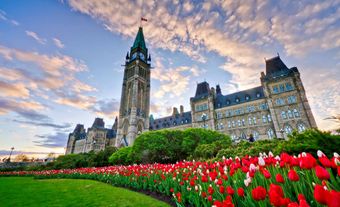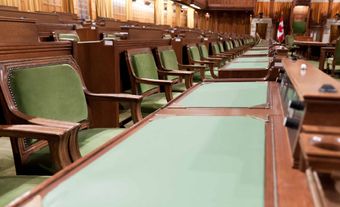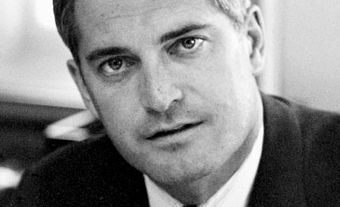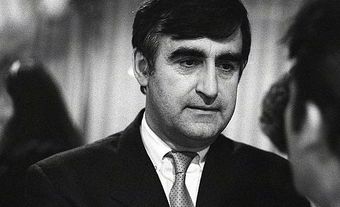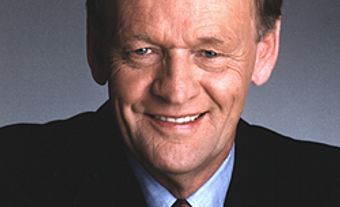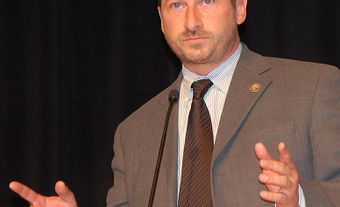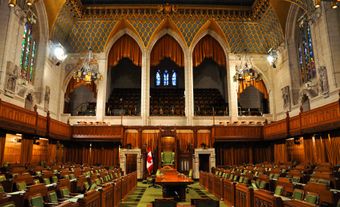Martin Brian Mulroney, PC, CC, GOQ, lawyer, businessman, politician, prime minister of Canada 1984–93 (born 20 March 1939 in Baie-Comeau, QC; died 29 February 2024 in Palm Beach, Florida, USA). One of Canada’s most consequential prime ministers, former Progressive Conservative Party leader Brian Mulroney helped his party win the most seats ever (211) in the 1984 federal election. He signed a landmark free trade deal with the United States and Mexico (NAFTA) and oversaw passage of the initially deeply unpopular Goods and Services Tax (GST). He also spent much political capital trying unsuccessfully to reach an agreement that would see Quebec sign the Constitution. The Canadian Press Newsmaker of the Year in 1983, 1984 and 1991, Mulroney took a strong stance against apartheid and made great strides in protecting the environment. But his historically low popularity led to an unprecedented defeat in 1993. By the time of his death, his measures, once labelled controversial, were largely seen by leaders of all parties as essential to Canada’s progress domestically and on the world stage.

Education and Early Life
Brian Mulroney was born and raised in Baie-Comeau, Quebec. He was the third of six children and the oldest son of Irish immigrant parents Benedict and Mary Irene (née O'Shea) Mulroney. His father, an electrician at the local paper mill, was anxious that his children escape their small town. (See also Resource Towns in Canada.)
Mulroney was sent to the private St. Thomas High School in Chatham, New Brunswick. He then attended St. Francis Xavier University in Antigonish, Nova Scotia. He studied political science and joined the campus Conservative club. He was also prime minister in the Combined Atlantic Universities Parliament.
Smooth beyond his years, fluently bilingual and gregarious, Mulroney worked for John Diefenbaker’s successful leadership campaign in 1956 before graduating in 1959. He became close with Diefenbaker and advised him on youth issues and Quebec. Mulroney then spent a year studying law at Dalhousie University in Halifax, where he worked for Nova Scotia premier Robert Stanfield’s 1960 re-election campaign. Mulroney then returned to Quebec. He earned a law degree from Université Laval in 1964.
Lawyer and Businessman
Brian Mulroney joined a major Montreal law firm, Ogilvy Renault (now Norton Rose Fulbright), after law school. He soon specialized in labour negotiations for businesses such as Iron Ore Company of Canada and Power Corporation of Canada. After his father died in 1965, Mulroney took on heavy family responsibilities.
In 1974–75 Mulroney won public attention as an articulate and hard-hitting member of the Cliche Commission. It looked into violence and corruption in the construction industry in Quebec. By now, he was the leading Conservative organizer and fundraiser in the province. Despite never having run for political office, he was a strong candidate for the leadership of the federal party in 1976. He was defeated on the third ballot.
Mulroney became vice president of Iron Ore Company in 1976. As president (1977–83), he emphasized labour relations. At the end of his term, he closed the company’s operation in Schefferville, Quebec, without serious political fallout.
Mulroney again ran for the Progressive Conservative leadership in 1983. It was a low-key effort, due to charges that his 1976 campaign had been too slick and showy. He beat former prime minister Joe Clark by 259 votes on the fourth ballot: 1,584 votes to 1,325.
Leader of the Opposition
Mulroney was elected Member of Parliament (MP) for the safe Conservative riding of Central Nova in Nova Scotia in 1983. As leader of the Opposition, he proved a skillful manager. He focused on healing party wounds and building a solid electoral machine. Moderate and conciliatory by nature, he called for a stronger private sector and less government intervention in the economy. He also sought minority French-language rights and closer Canadian-American and federal-provincial relations.
In the general election of 1984, Mulroney ran an almost flawless campaign against Prime Minister John Turner’s Liberals. His criticism of Turner’s patronage appointments for loyalists of former prime minister Pierre Trudeau — “You had an option, sir” — is regarded as one of the most decisive blows ever in a federal leaders’ debate. Mulroney won his home riding of Manicouagan while the PCs won 211 seats overall — the most in Canadian history.
Mulroney had always emphasized the importance of Quebec to the Conservatives, and in the election, made the risky decision to switch ridings to run in the one that included his Quebec hometown of Baie-Comeau. His pledge to bring Quebec into the Constitution “with honour and enthusiasm” persuaded many Quebec nationalists to support the PCs. The party won 58 seats in the province — including his own — compared to only one in 1980. It was the breakthrough that Mulroney had promised. He was sworn in as Canada’s 18th prime minister on 17 September 1984.
First Term as Prime Minister (1984–88)
The first two years of Mulroney’s government were often marked by indecision and scandals in his Cabinet. However, his natural talent for building relationships was evident early on. He and US president Ronald Reagan became steadfast friends after Mulroney serenaded Reagan with “When Irish Eyes are Smiling” during his visit to Quebec City on 17 March 1985 (the famous “Shamrock Summit”).
Mulroney was extremely active in foreign policy. Coming to power at the height of the Cold War, he was internationally recognized as part of a transformative group of global leaders that included Reagan, Thatcher, Mikhail Gorbachev, George H.W. Bush, François Mitterrand and Helmut Kohl.
In contrast to Reagan and British Prime Minister Margaret Thatcher, Mulroney took a strong stand against apartheid in South Africa. He backed Commonwealth sanctions against South Africa with a stirring speech at the United Nations in 1986. He is often credited with helping to end apartheid and to free Nelson Mandela. Shortly after Mandela was released from a South African prison in 1990, the anti-apartheid activist publicly thanked Canada for its support. (See Nelson Mandela: A Soft Spot for Canada.)

By the spring of 1987, Mulroney had launched the two main initiatives that would mark his first term: the negotiation of the Meech Lake Accord; and the conclusion of a Free Trade Agreement (FTA) with the United States. (See also Free Trade.) The FTA was signed in October 1987, largely due to Mulroney’s determination to get the deal done. With the deadline to sign the agreement about to expire, Mulroney called Reagan and asked him why the US could sign an arms treaty with its biggest enemy, the USSR, but not a trade deal with its closest ally. The deal was signed within the hour.
The FTA became the central issue in the bitterly contested 1988 federal election. The Conservatives overcame a resurgent Liberal Party, around whom opposition to the FTA had coalesced. Mulroney became the first Canadian prime minister in more than 30 years to win back-to-back majority governments.
Second Term as Prime Minister (1988–93)
After Brian Mulroney won a second term, his signature policy, the Meech Lake Accord, slowly unravelled. Its collapse in June 1990 was at least partly due to Mulroney’s widely quoted “roll of the dice” in scheduling the last first ministers conference so close to the deadline. (See also The Death of the Meech Lake Accord.) As the CBC reported at the time, “The perception that he gambled with the future of the country… may have awakened what Tory pollsters know is a latent mistrust for Mulroney in public opinion.”
The Meech Lake Accord fractured Mulroney’s coalition of Western conservatives and Quebec nationalists. The former resented the special status granted to Quebec as a “distinct society” and turned their attention to Preston Manning’s nascent Reform Party. For the latter, the collapse of Meech Lake was as close to an apocalyptic event as can be imagined in peacetime. Lucien Bouchard, Mulroney’s Quebec lieutenant and close friend since law school, defected from the PCs and formed the Bloc Québécois. The two men did not speak again until they quietly reconciled in the year before Mulroney’s death.
Mulroney’s government reached a new low in popularity with the imposition of the new Goods and Services Tax (GST). It went into effect on 1 January 1991. But Mulroney was only able to pass the GST into law by using an obscure emergency clause in the Constitution to add eight new senators. This gave the PCs the Senate majority needed to pass the bill. Mulroney was widely criticized for engaging in the same kind of patronage and corrupt political favours that he had once railed against.
Between 1997 and 1991, the Mulroney government introduced a series of tax reforms, privatized more than 20 Crown corporations, and deregulated the transportation, telecommunications, financial services, and energy industries. Critics blamed the severity of the recession in the early 1990s on the FTA, which went into effect on 1 January 1989. But the Conservatives continued their policy of open trade. They negotiated the North American Free Trade Agreement (NAFTA), which this time included Mexico.
Mulroney also took strong measures to protect the environment. In 1991, he negotiated the Acid Rain Accord with the United States. This air quality agreement significantly reduced acid rain levels and sulfur dioxide emissions. (See also Air Pollution.) While prime minister, he also passed the Environmental Protection Act (1988) and created eight new national parks.
Having made national reconciliation his raison d’etre, Mulroney tried once more to gain Quebec’s signature to the Constitution with the Charlottetown Accord in the fall of 1992. (See Charlottetown Accord: Document.) Mulroney managed to gain the support of all 10 provinces and could have legally enacted the amendment. But, still stinging from accusations that Meech Lake had been a backroom deal, he opted instead to put the Accord to a binding national referendum. On 26 October 1992, 54.3 per cent of the country voted against it.
Retirement from Politics
In November 1992, Brian Mulroney’s popularity was a mere 12 per cent — the lowest of any prime minister in Canadian history. After much speculation, he announced his decision to leave politics in February 1993. (He and close associates later insisted that it had always been his intention to step down after two terms.) He had shown great skill in uniting the traditionally fractious Progressive Conservative Party, mainly by building a coalition of Québécois and Westerners. But Mulroney’s constitutional failures; the economic problems brought on by the persistent recession; the lingering bitterness over the GST; and his personal unpopularity had made his political future and that of his party look bleak.
Mulroney turned over the office of prime minister to new PC leader Kim Campbell on 25 June 1993. His Conservative coalition disintegrated in the election on 25 October 1993. The party won only two seats and lost its status as an official party in the House of Commons. Although Campbell was acknowledged as having run an error-ridden campaign, many also blamed Mulroney’s failures and his personal unpopularity for the most unprecedented disaster in Canadian political history.
Post-Political Career
Brian Mulroney was senior partner at the law firm Norton Rose Fulbright (formerly Ogilvy Renault) from 1993 until his death in 2024.
In 1998, Mulroney became chairman of Forbes Global Business and Finance, the English-language international edition of Forbes magazine. He also served as director on several corporate boards, including Barrick Gold, Blackstone, and Wyndham Worldwide. His autobiography, Memoirs (2007), was a national No. 1 bestseller. In 2014, he was named chairman of Quebecor Inc., a Montreal-based media company. He was also in demand internationally as a public speaker.
In 2017, at the request of Prime Minister Justin Trudeau, Mulroney was Canada’s envoy in talks for the revised North American free trade deal: the Canada-United States-Mexico Agreement (CUSMA).
Dedicated to the cause of higher education for youth, Mulroney was vice-president of the board of directors of the Horatio Alger Association of Canada. He also raised $125 million for the Brian Mulroney Institute of Government at St. Francis Xavier University.
Controversies
In 1993, Mulroney accepted at least $225,000 in cash payments via German Canadian lobbyist Karlheinz Schreiber in exchange for the purchase of Airbus aircraft by Air Canada in 1988 (when it was still a Crown corporation). News of the Airbus Affair first surfaced in 1995. Mulroney sued the Canadian government for defamation and won an out-of-court settlement in 1997. (See also Mulroney Fights Back Over Airbus; Mulroney Launches Suit; Mulroney Wins an Apology.) However, in 2010, the Oliphant Commission confirmed that Mulroney had in fact received three cash payments of at least $75,000 each.
In 2020, it came to light that some of the funding Mulroney had raised for the Brian Mulroney Institute of Government had come from billionaires involved in international corruption and bribery scandals.

Personal Life and Family
In 1973, Brian Mulroney married 19-year-old Mila Pivnicki, a Serbian Canadian who immigrated to Canada with her family in 1958. They have four children: Caroline (born 1974); Ben (born 1976); Mark (born 1979); and Nicolas (born 1985).
Caroline Mulroney made an unsuccessful bid for the leadership of the Ontario Progressive Conservative Party in 2018. She was elected as the MPP for York-Simcoe that year. She has served as minister of transportation, minister of francophone affairs and president of the Treasury Board. Ben Mulroney is a TV host who gained national recognition as the host of Canadian Idol, the entertainment news show etalk and CTV’s flagship morning show Your Morning. Mark and Nicolas Mulroney both work in banking.
Brian Mulroney had several life-threatening health scares in his later years. He needed pancreatic surgery in 2005, required emergency surgery in 2020 and underwent treatment for prostate cancer in 2023. He died in Palm Beach, Florida on 29 February 2024 at the age of 84. His body was laid in state in Ottawa for two days before a state funeral was held at Montreal’s Notre-Dame Basilica on 23 March 2024.
Honours
Brian Mulroney was made a Companion of the Order of Canada in 1998 and a Grand Officer of the Ordre national du Québec in 2002. He was awarded honours from five foreign governments, including one for his “exceptional contribution to the liberation movement of South Africa.” He also received the Woodrow Wilson Award for Public Service (2003) and the George Bush Award for Excellence in Public Service (2018), as well as more than a dozen honorary degrees.
Mulroney eulogized both Ronald Reagan and George H.W. Bush at their state funerals in 2004 and 2018, respectively. He is the only foreign leader ever to eulogize two US presidents.
In 2021, Mulroney’s alma mater, Université Laval, announced that it would name its new school of international relations the Carrefour international Brian Mulroney.
Legacy
The abject failure of the Meech Lake and Charlottetown accords, combined with the vicious public opinion toward both the GST and Brian Mulroney’s corruption scandals, led to the cratering of his popularity and the disastrous 1993 election results.
The results were initially more mixed for free trade, which was part of the global trend toward neoliberalism and globalization. It brought economic prosperity in some respects, but critics said it also led to the erosion of the middle class and worsening income inequality. When the Liberals took power in 1993, they moved ahead with implementing an expanded North American Free Trade Agreement (NAFTA) that also included Mexico. Since then, successive Liberal and Conservative governments have sought free trade agreements with other countries around the globe.
Mulroney’s records on human rights and the environment are both strong. In 2006, he was voted the “greenest” prime minister in Canadian history by a panel of leading environmental groups. And the once-reviled GST has since proved remarkably effective at providing financial stability to the federal government. As Mulroney once told TVOntario, “Every finance minister in Canada would be up a tree without it.” In 2010, the Bank of Montreal’s deputy chief economist Douglas Porter called the introduction of the tax “one of the better moves by federal governments in recent decades.”
Mulroney’s close friend, businessman Paul Desmarais, had once told him to “‘let your garden grow”’ —– meaning that over time, his initially unpopular accomplishments would not only be recognized, but also saluted. In 2009, a survey by the Hill Times named Mulroney Canada’s “most admired” former prime minister. In 2019, the Toronto Star called him “our greatest statesman prime minister… a courageous, transformative leader who moved our country forward with purposeful conviction during uncertain times.”
Shortly after Mulroney died, a poll by the Ottawa-based Sparks Insights company reflected how popular his record of achievements had become. Among other things, 83 per cent of respondents felt he had “done a good job” as prime minister, including more than 80 per cent in every age group. At least three quarters of supporters of every major political party — including the secessionist Bloc Québécois and the left-leaning New Democratic Party — expressed a positive feeling about his record. And in a turnaround from initial controversy, 85 per cent now saw his negotiation of the Canada-US Free Trade Agreement in a positive light.
See also Brian Mulroney (Interview); Canadian Prime Ministers; Timeline: Elections and Prime Ministers.
Awards
- Privy Council(1984)
- Grand Cross of the National Order of Honour and Merit, Government of Haiti (1994)
- Companion, Order of Canada(1998)
- Grand Officer, Ordre national du Québec(2002)
- Queen Elizabeth II Golden Jubilee Medal (2002)
- Woodrow Wilson Award for Public Service (2003)
- Order of Kniaz (King) Yaroslav the Wise, First Class, Government of Ukraine (2007)
- Grand Cordon, Order of the Rising Sun, Government of Japan (2011)
- Queen Elizabeth II Diamond Jubilee Medal (2012)
- Supreme Companion of O.R. Tambo (Gold), Government of South Africa (2015)
- Commandeur de la Légion d'honneur, Government of France (2016)
- George Bush Award for Excellence in Public Service (2018)
Honorary Degrees
- Doctor of Laws, Memorial University of Newfoundland(1980)
- Doctor of Humane Letters, Johns Hopkins University (1992)
- Doctor of Social Science, Central Connecticut State University (1994)
- Doctor of Philosophy, Tel Aviv University (1994)
- Doctor of Laws, University of Missouri–St. Louis (1998)
- Doctor of Laws, Concordia University(2005)
- Doctor of Laws, Boston College (2007)
- Doctor of Laws, University of Western Ontario(2007)
- Honorary Doctorate, Université Laval (2007)
- Honorary Doctorate, Université de Montréal (2016)
- Doctor of Laws, McGill University (2017)
- Honorary Degree, St. Thomas University (2018)
- Doctor of Laws, Ontario Tech University (2021)

 Share on Facebook
Share on Facebook Share on X
Share on X Share by Email
Share by Email Share on Google Classroom
Share on Google Classroom
